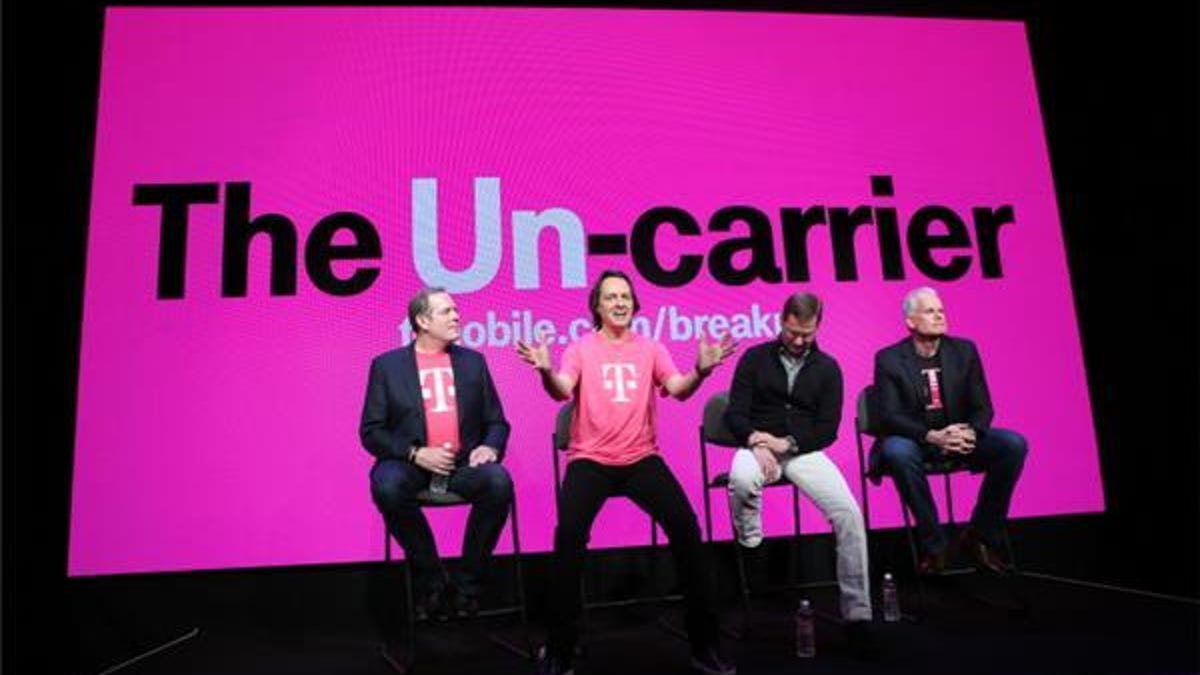T-Mobile execs on how they can afford to buy out your early-termination fees
In an interview with CNET, the executives dish on their ETF buyout plan and the push for faster WideBand LTE, and they continue to dump on Sprint.

LAS VEGAS -- Well, T-Mobile had an exciting week.
CEO John Legere started things off on Monday night by getting himself kicked out of a party thrown by AT&T (as a result of this reporter's tweeting -- sorry).
Legere and his team followed up today with Un-carrier 4.0, which entails paying the early-termination fees for customers and family-plan members, allowing them to switch to T-Mobile more easily. T-Mobile will pay up to $350 a line for up to five lines, as well as offer a credit of up to $300 for the old phones.
T-Mobile is a big company, but how can it afford to foot the bill for all those ETFs? CNET talked to T-Mobile Chief Marketing Officer Mike Sievert, Chief Technology Officer Neville Ray, and Chief Financial Officer Braxton Carter about that and the future of the "Un-carrier."
As for the ETFs, the financial hit won't be as bad as the headline $350 per line figure would suggest. Carter said he estimated T-Mobile would pay an average of less than $150 per line, noting that some customers are well into their contracts and don't have such onerous fees.
Carter said the move to pay off ETFs would be positive on a net present value basis, which means that while T-Mobile would suffer a hit in the short term, it would make up for it and turn a profit over the long term.
On top of that, for additional revenue, T-Mobile plans to refurbish and resell the phones customers trade in (customers are actually required to turn in their own phone as part of the program).
Carter said he doesn't believe the move will affect the company's longer term revenue and earnings before interest, taxes, depreciation, and amortization targets.
Beyond the ETF news, T-Mobile also continued to talk up its wireless network, which Legere and Ray both touted as the fastest in the nation, based on download speed data taken from Speedtest.net. The next challenge for T-Mobile will be to educate customers and get them past the perception that its network is inferior to AT&T and Verizon Wireless, both of which have much larger marketing budgets and their own awards and network claims.
One such term T-Mobile is looking to educate consumers on is Wideband LTE. Wideband LTE is an industry expression that refers to higher speeds enabled by adding spectrum capacity to a market.
"We're now the fastest, and people need to know that," Sievert said.
Other carriers are able to tout Wideband LTE, but they haven't been able to because they're dealing with their congestion issues, Sievert said.
Sievert said he wouldn't try to outspend or even match Verizon or AT&T in marketing, preferring to use social media and flashy press conferences like the one at the Consumer Electronics Show to get attention. One of the components of T-Mobile's new push is a part of the company's Web site that allows customers switching over to write a breakup letter to their old carrier and share it socially, giving T-Mobile a lot of free publicity.
Ray, meanwhile, also talked about the opportunity that comes from the spectrum T-Mobile recently purchased from Verizon Wireless. The spectrum runs at a lower frequency, which means it can go over a wider distance. The lower band spectrum means T-Mobile can stretch beyond its current coverage area, providing them with LTE. One of the knocks on T-Mobile has been its inability to stretch beyond the major markets.
Ray said he was eager to get started on the rollout of the network and said he'd continue to be aggressive in his work. Given that the licenses for the spectrum won't be handed over until the middle of 2014, the work to expand coverage won't happen until later this year, with more work next year.
The executives also had further harsh words for rival Sprint, questioning its ability to deliver a full nationwide LTE network, with Sievert saying that T-Mobile's current network is faster than Sprint's projected speeds a year from now.
Sprint on Tuesday announced its "Framily" family and friends plan, as well as six additional markets for Spark, which is Sprint's brand for its faster LTE network. The company held an event Tuesday night to provide a review of the strengths of Spark at CES. During the press conference, Ray bashed Sprint's efforts as a "$h!tstorm."
A Sprint representative wasn't immediately available to comment.

